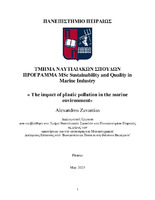The impact of plastic pollution in the marine environment

Master Thesis
Author
Ζαβαντίας, Αλέξανδρος
Zavantias, Alexandros
Date
2023-05View/
Abstract
It is actually a fact that human activities in the oceans have increased significantly in recent decades. The expansion of coastal and marine activities has undoubtedly adversely affected the marine environment while fundamentally affecting ecosystem goods. In addition, coastal and marine human activities have generated significant amounts of waste and marine litter, which may contaminate the marine environment.
The plastics are synthetic polymers and have been used for over a century. It is a material consisting of a wide range of synthetic or semi-synthetic organic compounds that are flexible and can be molded into solid objects. Plastics are produced by converting natural products or by synthesis from primary chemicals, generally from oil, natural gas or coal. The majority of marine microplastics come from rivers and estuaries. The main sources refer to runoff from urban areas, inflows from treatment plants sewage, sewage system overflow and from industrial inputs that contribute to the composition of river water.
One of the most important measures to deal with marine pollution from plastics is to raise the awareness of all involved entities, “players” of the plastic industry and fishing and consumers - citizens, about the consequences of this environmental problem. Public awareness is an integral part of primary prevention strategies and aims on the one hand to reduce plastic waste in aquatic ecosystems, and on the other hand to ecologically awaken and activate the individual. The education of both professionals and citizens is the first component of programs aimed at reducing marine plastic waste. Undoubtedly, however, changing attitudes and behaviors is not an easy task, especially when it conflicts with existing and established social norms, knowledge and habits.


